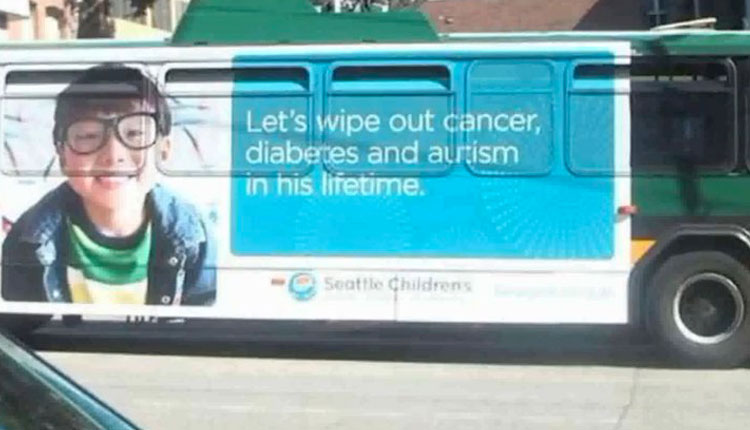Seattle Area Hospital in Hot Water Over Autism Ads
Seattle Children’s Hospital was forced to pull its new ads from King County buses after complaints about its call to eradicate autism. The cherubic face of a young boy gazed out from the side of a bus which read, “Let’s wipe out cancer, diabetes and autism in his lifetime.”
The juxtaposition of autism with tragic and often fatal diseases captured the attention of The Autistic Self Advocacy Network’s Washington chapter (ASAN-WA), who in turn organized an online campaign to galvanize opposition to the message.
Seattle Children’s received scores of emails, phone calls and comments on its Facebook page and subsequently pulled the ad last Friday, posting this comment: “We are sorry for the hurt and anger these ads have caused – that was never their intent."
Just like Autism Speaks with its "I Am Autism" video a few years ago, Children’s Hospital made a similar gaffe in not respecting the broad spectrum that is autism.
As Matt Young, co-leader of ASAN-WA put it, “Autism is a disability, but it is not a disease. It is not a life-threatening illness. The idea it’s a state to be wiped out has much negative impact on our lives.” ASAN champions the notion of "neurodiversity,"or autism as a burden/blessing of having your brain differently wired.
Incidents such as these serve to re-ignite the debate between viewing autism as a disease to be cured versus a disorder to be respected. Parents of low functioning, self-harming children would do anything to cure their children of autism, while at the high functioning end of the spectrum there is more concern for civil rights and equal opportunity.
But at neither end of the spectrum is autism regarded as a life-threatening disease, even though children with autism are more vulnerable to calamities associated with their disorder, such as wandering. Fairness calls for accuracy and Seattle Children’s was rightly criticized for not demonstrating an appreciation of the nuances of describing autism.
On Monday, Katharine Fitzgerald, director of marketing and health promotion at Seattle Children’s said: “It’s been difficult because we do so much to support children, teens, and families affected by autism here at Seattle Children’s, and we’re doing amazing research at our research institute.”
Children’s Hospital also boasts a "cutting-edge" Autism Center. The bus ad was intended to raise awareness for Seattle Children’s Research Institute and reflect the “breadth and depth“ of the institute’s research arm, according to Fitzgerald.
They certainly raised awareness, but not the way they intended. Like many others before them, they are now aware of what a minefield it is to address autism from a solely problematic perspective.

